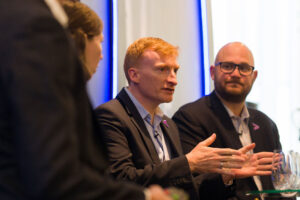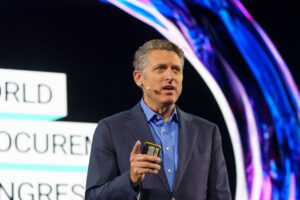The first event of Procurement Leaders’ ‘Innovation In’ virtual series is focused on emerging from the pandemic stronger, ready to deliver positive change. The speakers on day two shared their experience on how procurement teams can drive change in their organisations.
Creating an impact through realistic ESG targets
Simply by managing staggering amounts of spend procurement functions are instrumental in making progress. Whether the goal is to reduce carbon emissions, empower minority-owned businesses, or improve working conditions throughout the supply chain, procurement’s buying decisions can make a real and positive difference.
This does not mean diverse suppliers will be handed work on a silver platter just because procurement has a target to meet. As Nedra Dickson, Managing Director, Global Supplier Inclusion & Sustainability at Accenture puts it, buyers need to “expand opportunities for diverse suppliers – they still need to bid for work just like every other supplier. But by casting a broader net in sourcing we can better include minority-owned companies that our bid invitations might not have previously reached”.
The c-suite must through its own commitment to sustainability make sure procurement’s work is aligned with the broader strategy. Most organisations now have a dedicated ESG programme in place, and while making commitments to various activities is part of making progress, these programmes must be results-driven and shaped by a fresh dose of realism.
For example, as Heineken’s Patrick Barton, sourcing director of raw materials, and Geraldine Bernard, sustainable agriculture manager shared, the brewing company ultimately aim to carry out over 1,500 carbon reduction projects with its agriculture partners. Where reality kicks in is that they currently stand at just over 150, which in itself is a great start but far from the end goal. In a few years 150 will turn to 500 as projects are rolled out to new countries, and 500 will ultimately turn to 1,500.
This isn’t to say that companies should not set ambitious targets, big corporations absolutely have a shared responsibility to take action and use their size for the greater good. More achievable milestones will simply ensure commitment on the journey towards the end goal.
Using data to ensure longevity of ESG programmes
The word ‘data’ tends to be used in abundance in any procurement-related discussion. It is now increasingly creeping into sustainability lingo as well, and rightly so. Good data enables teams to take much more targeted action and it helps ensure long-term commitment to programmes. The only problem is, getting data right is hard.
Luckily, our expert speakers had some tips to share. By working with non-profits such as MSDUK companies can tap into existing networks to find minority-owned businesses, but ultimately procurement must build its own connections and accumulate knowledge on who to partner with (and who not to).
Technology helps too. IBM has built a blockchain solution for automotive industry to ensure responsible sourcing of cobalt, an essential raw material for lithium-ion batteries. SmartKYC’s Artificial Intelligence solution crawls the depths of the online world to find risks associated with the about 400 million companies that exists on our planet, helping procurement carry out background checks on suppliers in any language. And Ecovadis’ sustainability platform allows companies assess the sustainability of their own and their suppliers’ operations.
It is great to see reporting and knowledge management solutions being deployed, primarily as they help companies be kept accountable for their promises. ESG data really is more important than ever, as companies must report on their progress all the way to shareholders. But we all must be savvy in what we track and what conclusions we draw from the data. As Rhonda Morris, chief human resources officer at Chevron demonstrated, “aggregate data on work done with all minority groups is not good enough. Companies must disaggregate data to see where they are actually making progress towards racial equity”.
‘Innovation In’ is our virtual series to challenge your thinking and inspire your strategy. Visit ‘Innovation In’ website to register your complimentary place for upcoming events in the series.





















